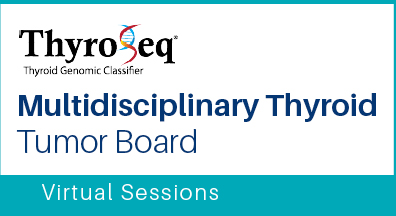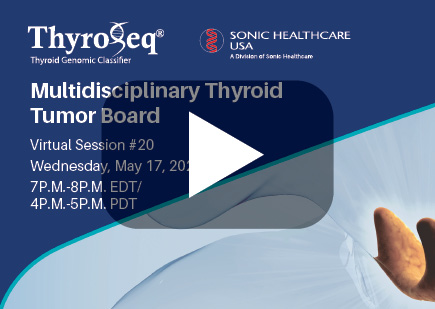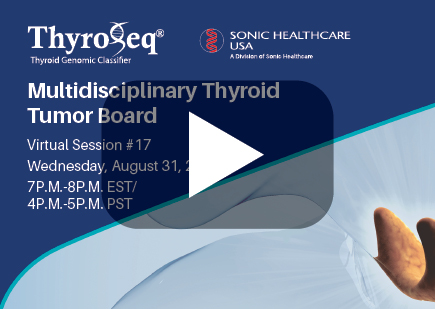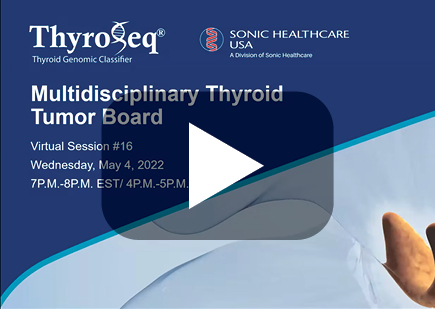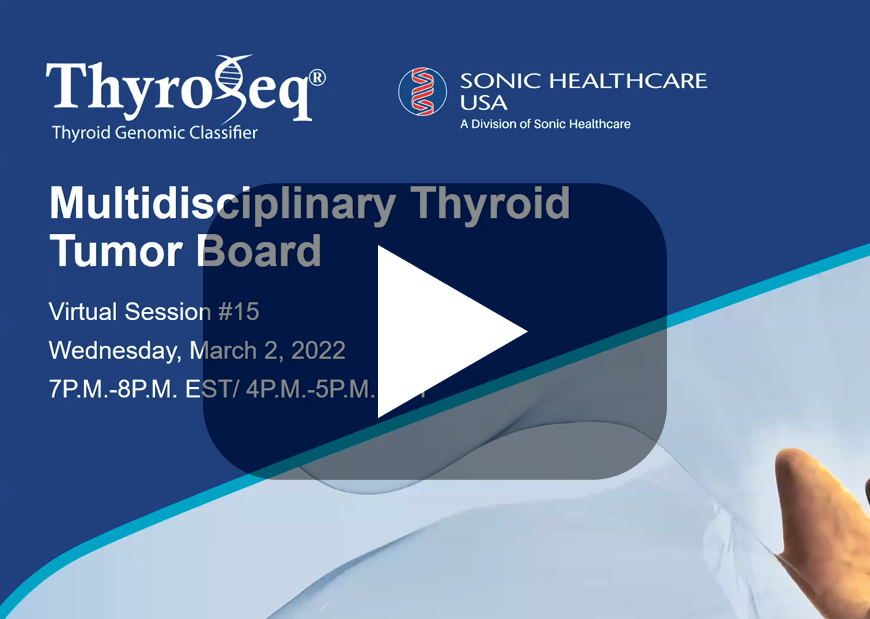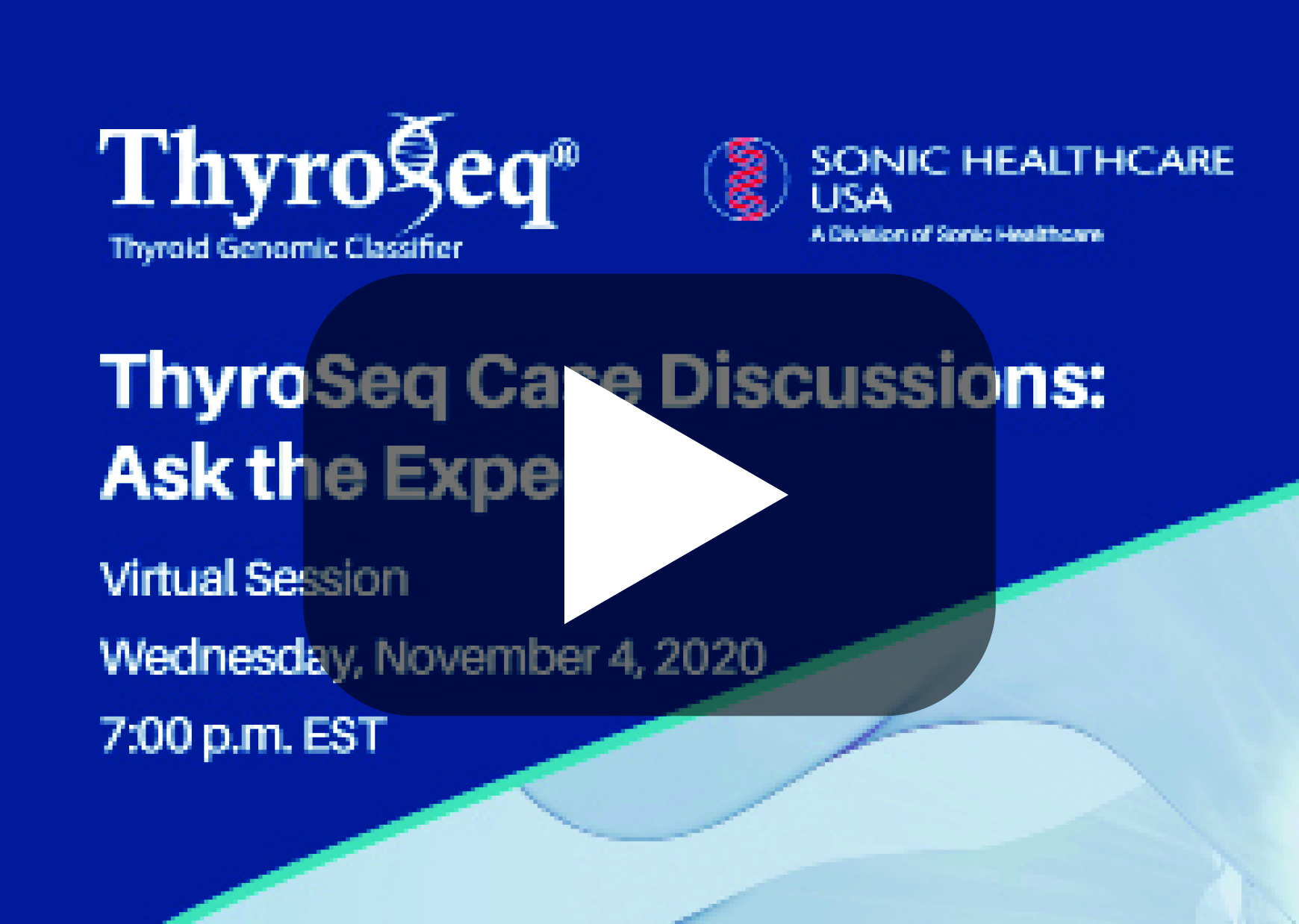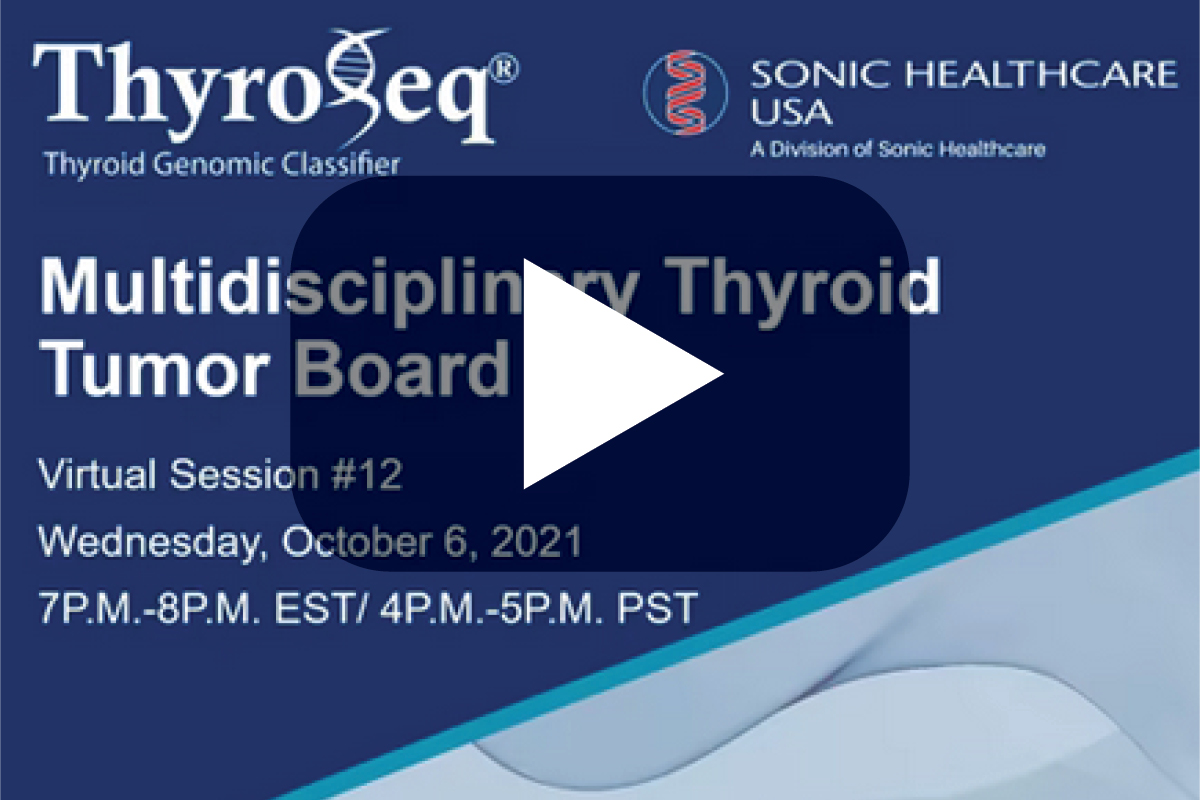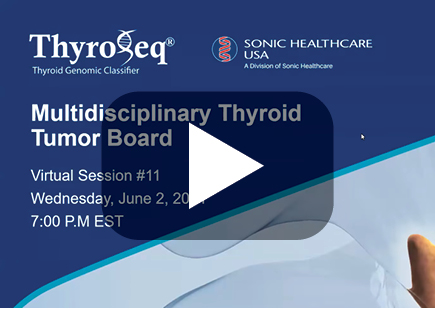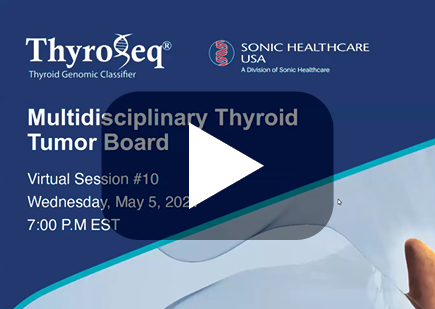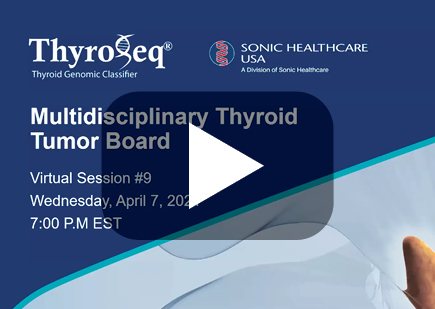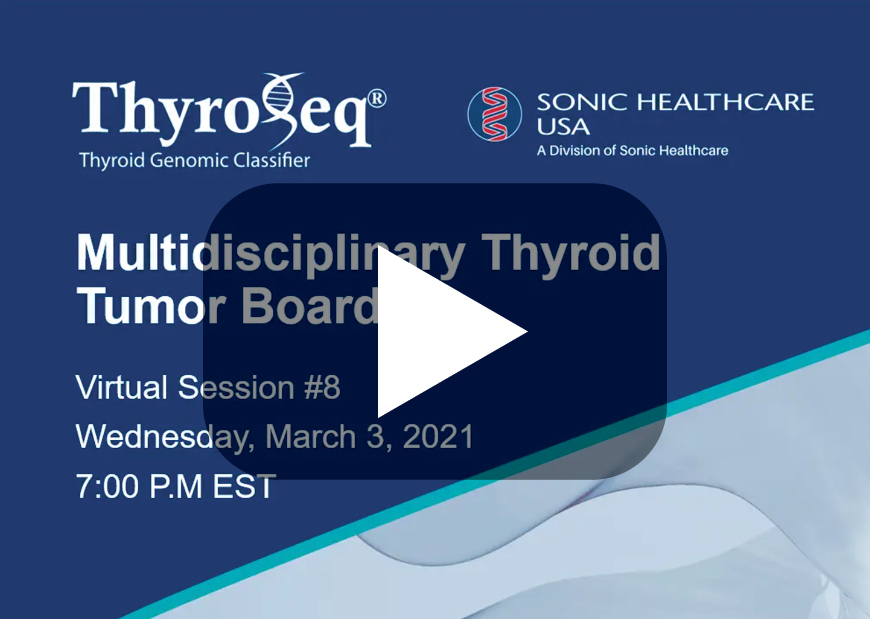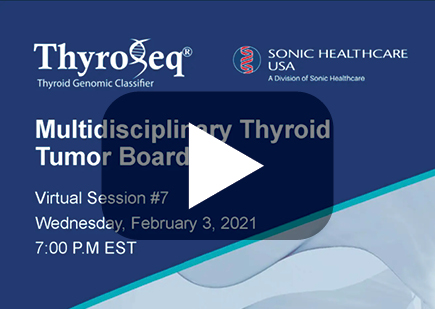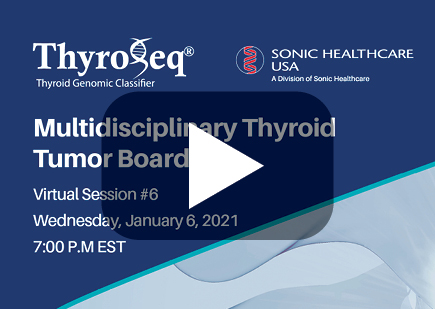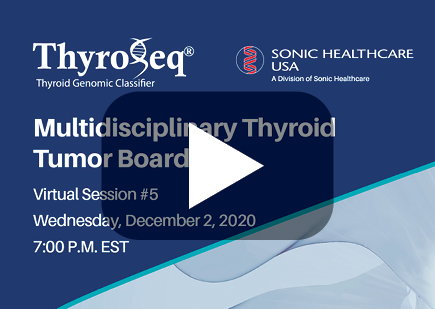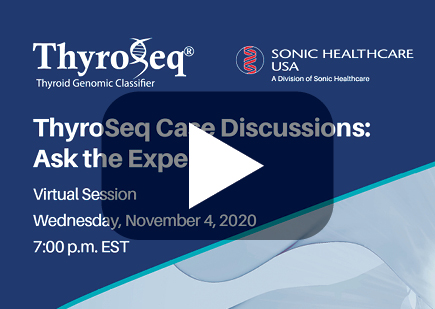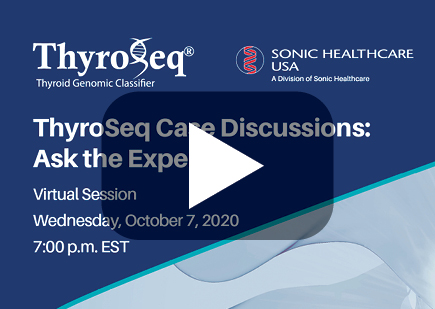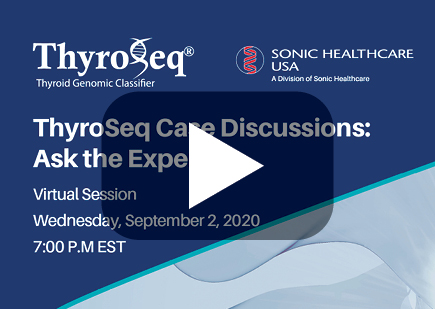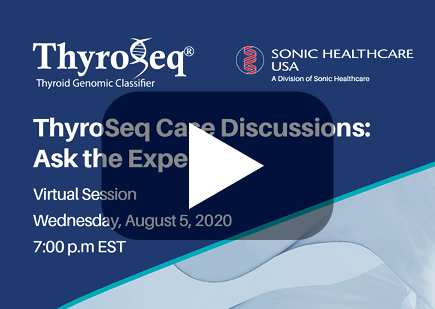Panelists:
Yuri Nikiforov, MD, PhD, University of Pittsburgh Medical Center
Masha Livhits, MD, David Geffen School of Medicine
Bryan Mclver, MD, PhD, Medical Group-Midlands, Prisma Health Medical Group
Kepal N. Patel, MD, FACS, NYU Langone Health
Case #20-1: View Case
A 33 yo pt with Bethesda 3 cytology nodule with LTK fusion and surgical follow-up. Questions for discussion: extent or surgery and behavioral risk factors for gene fusions. (Presented by Caroline Messer, MD, FACE)
Case #20-2: View Case
A 31 yo pt with B3 cytology nodule with 2 PTEN mutations and subsequent germline genetic testing if pt and family members. Questions for discussion: germline vs somatic mutations, pt management, need for genetic counseling. (Presented by Kristen Otto, MD)
Case #20-3: View Case
A 23 yo pt with 3 nodules in one lobe, all positive for NTRK3 fusions. Question for discussion: independent tumors or intraglandular spread, extent or surgery. (Presented by Jeffrey Nussbaum, MD)
Panelists:
Yuri Nikiforov, MD, PhD, University of Pittsburgh Medical Center
Sarah Mayson, MD, University of Colorado School of Medicine
R Michael Tuttle, MD, Memorial Sloan Kettering Cancer Center
Linwah Yip, MD, University of Pittsburgh Medical Center
Case #19-1: View Case
85 yo F with 1.2 cm nodule growing on long-term active surveillance, now with Bethesda 3 cytology and BRAF plus TERT mutations.
Discussion of cancer risk stratification and surgical and post-surgical patient management. (Presented by Mikhail Signalov, DO, FACE, FACOI, ECNU)
Case #19-2: View Case
70 yo F with 4.6 cm nodule with Bethesda 2 cytology and Benign pathology on lobectomy in 2015 presented in 2022 with sternum metastasis. Thyroid tumor and metastasis both positive for HRAS, TERT, EIF1AX, and DICER1 mutations.
Discussion of diagnostic challenges of RAS plus TERT positive nodules. (Presented by Alex Goldberg, MD)
Case #19-3: View Case
27 yo F with 2.5 cm Bethesda 6 module. On lobectomy intrathyroidal classic-type papillary carcinoma with one small lymph node metastasis with extranodal extension; positive for an isolated BRAF V600E mutation.
Discussion of cancer risk stratification and potential completion thyroidectomy and RAI treatment. (Presented by Neha Mehrotra, MD)
Panelists:
Yuri Nikiforov, MD, PhD, University of Pittsburgh Medical Center
Stephanie Fish, MD, Memorial Sloan Kettering Cancer Center
Bryan R. Haugen, MD, University of Colorado School of Medicine
Kepal N. Patel, MD, FACS, NYU Langone Health
Case #18-1: View Case
29 yo F with 1.34 cm nodule with Bethesda 3 cytology positive for RAS-like gene expression alterations (GEA).
Discussion of patient management, surgery vs observation. (Presented by Brittany Henderson, MD, ECNU)
Case #18-2: View Case
55 yo F with 6 cm nodule, Bethesda 3 cytology and high-risk molecular signature with RAS, TERT, and EIF1AX mutations.
Discussion of surgical and post-surgical patient management. (Presented by Sumedha Chablani, MD)
Case #18-3: View Case
Two patients with small nodules with similar low-level BRAF V600E mutation but different probabilities of cancer.
Discussion of test sensitivity for detecting BRAF mutations, factors contributing to cancer probability assessment, and patients' management. (Presented by Stephanie Giparas, PA, Kristen Otto, MD and Bryan McIver, MD, PhD)
Panelists:
Yuri Nikiforov, MD, PhD, University of Pittsburgh Medical Center
Masha Livhits, MD,David Geffen School of Medicine
Bryan McIver, MD, PhD, Moffitt Cancer Center
Linwah Yip,MD, University of Pittsburgh Medical Center
Case #17-1: View Case
37 yo F with 2.8 cm nodule with Bethesda 3 cytology positive for NRAS, CNA and GEA.
Discussion of surgical management, lobectomy vs total thyroidectomy. (Presented by Brittany Henderson, MD, ECNU)
Case #17-2: View Case
79 yo F with 3.6 cm Bethesda nodule with Hurthle cell-type copy number alterations and TERT with known surgical outcome.
Discussion of extent of surgery and post-surgical management for high-risk cancer. (Presented by Reed Doefler, MD)
Case #17-3: View Case
69 yo man with history of metastatic follicular carcinoma and current neck lump with Bethesda 4 cytology and KRAS and EIF1AX mutations.
Discussion of molecular profiles of primary and recurrent cancer, and sensitivity of testing fixed cytology samples and respected tumor tissues. (Presented by Kristen Otto, MD and Stephanie Giparas, PA)
Panelists:
Yuri Nikiforov, MD, PhD, University of Pittsburgh Medical Center
Masha Livhits, MD, David Geffen School of Medicine
R Michael Tuttle, MD, Memorial Sloan Kettering Cancer Center
Linwah Yip, MD, University of Pittsburgh Medical Center
Case #16-1: View Case
Patient with Bethesda III cytology thyroid nodule positive for PAX8-GLIS fusion.
36 yo with 1.5 cm nodule with Bethesda III cytology positive for PAX8-GLIS3 fusion characteristic of hyalinizing trabecular tumor. Discussion of patient management with consideration for of active surveillance. (Presented by Brittany Henderson, MD)
Case #16-2: View Case
Patient with Bethesda IV Hurthle cell cytology and NRAS plus TERT mutations.
54 yo with 1.8 cm nodule with Bethesda IV Hurthle cell cytology and NRAS plus TERT mutations. On lobectomy, mostly necrotic Hurthle cell tumor with no invasion. Discussion of need for completing thyroidectomy and possible RAI. (Presented by Jules Aljammal, MD, ECNU)
Case #16-3: View Case
16 yo patient with nodule positive for DICER1 mutation and copy number alterations.
16 yo patient with 2.7 cm Bethesda III nodule positive for DICER1 mutation plus CNA. On total thyroidectomy, it's papillary carcinoma, high grade with multiple mitoses. Discussion of patient management and specifically need for RAI. (Presented by Gabrielle Grinstein, MD)
Case #16-4: View Case
Patient with 3.5 cm nodule found during pregnancy with Bethesda III cytology and HRAS mutation.
35 yo patient with 3.5 cm nodule found during first trimester pregnancy, with Bethesda III cytology and HRAS mutation. Papillary carcinoma found on surgery. Discussion of further management after delivery. (Presented by Rachael Chambers, BSc, MBBS, FRCPA)
Panelists:
Yuri Nikiforov, MD, PhD, University of Pittsburgh Medical Center
Bryan R. Haugen, MD, University of Colorado School of Medicine
Michael W. Yeh, MD, FACS, UCLA
Linwah Yip, MD, University of Pittsburgh Medical Center
Case #15-1: View Case
Patient with paraesophageal mass of thyroid origin with HRAS mutation, CNA, and GEA
61 yo male with 2.5 cm paraesophageal mass with Betheasda IV cytology and HRAS mutation, copy number alterations, and gene expression alterations. Discussion of probability of cancer in RAS-positive nodules and patient management with focus on extent of surgery. (Presented by Susan Wasserman, MD)
Case #15-2: View Case
Patient with 1.9 cm nodule with HRAS mutation considered for active surveillance
68 yo female with 1.9 cm thyroid nodule, contradictory cytology readings and NRAS mutation on ThyroSeq testing. Discussion of patient management with focus on consideration for active surveillance. (Presented by Jules Aljammal, MD, ECNU)
Case #15-3: View Case
Patient with 1.2 cm nodule low-positive on ThyroSeq for C cell-markers
38 yo female with 1.2 cm thyroid nodule and low positive for C cell markers on ThyroSeq and 11.2 pg/mL serum calcitonin. Discussion of probability of medullary carcinoma and patient management. (Presented by Brittany Henderson, MD, ECNU)
Panelists:
Yuri Nikiforov, MD, PhD, University of Pittsburgh Medical Center
Bryan R. Haugen, MD, University of Colorado School of Medicine
Kepal N. Patel, MD, FACS, NYU Langone Health
Linwah Yip, MD, University of Pittsburgh Medical Center
Case #14-1: View Case
Thyroid nodule with Hurthle cell-type CNA, TP53 and PTEN mutations and lobectomy
59 yo female with 1.7 cm nodule with high risk molecular signature (CNA of Hurthle cell type and TP53 and PTEN mutations with minimally invasive Hurthle cell carcinoma on lobectomy. Discussion of patient management with focus on need for completion thyroidectomy. (Presented by Silvia Gra Menendez, MD)
Case #14-2: View Case
Large (5 cm) thyroid nodule with PAX8-PPARG fusion and lobectomy
54 yo male with 5 cm nodule positive for PAX8-PPARG fusion and follicular carcinoma with extensive vascular invasion on lobectomy. Discussion of need for completion thyroidectomy and post-surgical RAI. (Presented by Stan Goykhman, MD)
Case #14-3: View Case
Small (0.3 cm) thyroid nodule positive for BRAF V600E and GEA
55 yo female with underlying Hashimoto’s thyroiditis and 0.3 cm nodule positive for BRAF V600E and Gene Expression Alterations and no tumor found on pathology after lobectomy. Discussion of possible reasons for not finding tumor on pathology and implications for patient management. (Presented by Brittany Henderson, MD, ECNU)
Panelists:
Yuri Nikiforov, MD, PhD, University of Pittsburgh Medical Center
Sarah Mayson, MD, University of Colorado School of Medicine
Nikolaos Stathatos, MD, Harvard Medical School
Linwah Yip, MD, University of Pittsburgh Medical Center
Case #13-1: View Case
Thyroid nodule positive for CNA of Hurthle cell type, PTEN, and TP53 mutations
54 yo female with 2.7 cm nodule with high risk molecular signature (CNA of Hurthle cell type and PTEN and TP53 mutations with known surgical outcome; discussion of patient management. (presented by Maham Qureshi, MD)
Case #13-2: View Case
Thyroid nodule with TERT mutation and gene expression alterations
70 yo female with thyroid nodule positive for TERT mutation and gene expression alterations; discussion of extent of surgery and RAI treatment. (Presented by Mikhail Signalov, DO, FACE, FACOI, ECNU)
Case #13-3: View Case
Thyroid bed nodule Benign cytology and ALK fusion
30 yo male with therapeutic radiation, thyroidectomy for papillary with prior thyroid surgery, now with two nodules in thyroid bed with benign cytology and ALK fusion on molecular testing. Discussion of positive molecular testing in benign cytology nodules. (Presented by Steven Hodak, MD, ECNU)
Panelists:
Yuri Nikiforov, MD, PhD, University of Pittsburgh Medical Center
Bryan R. Haugen, MD, University of Colorado School of Medicine
Bryan Mclver, MD, PhD, Moffitt Cancer Center
Linwah Yip, MD, University of Pittsburgh Medical Center
Case #12-1: View Case
A 2 cm thyroid nodule with ALK fusion on FNA and lobectomy
44 y.o. woman with a 2 cm left lobe nodule positive for ALK fusion and lobectomy. Discussion of tumor aggressiveness and consideration for completing thyroidectomy. (presented by Jules Aljammal, MD)
Case #12-2: View Case
A 5 cm papillary carcinoma with NTRK3 fusion and TERT mutation
69 y.o. female with 5 cm PTC with NTRK3 fusion and TERT mutation, local recurrence and distant metastases. Discussion of management and consideration for targeted therapies with NTRK inhibitors. (presented by Charit Taneja, MD)
Case #12-3: View Case
Two right sided thyroid nodules with NRAS+GEA and EIF1AX mutations
58 y.o. female with two nodules in right lobe, a 1.7 cm positive for NRAS mutation and gene expression alterations and 2.6 cm with non-splice EIF1AX mutation (currently negative by ThyroSeq) and surgical outcome available. Discussion of patient management. (presented by Reed Doefler, MD)
Panelists:
Yuri Nikiforov, MD, PhD, University of Pittsburgh Medical Center
Bryan R. Haugen, MD, University of Colorado School of Medicine
Michael Yeh, MD, FACS, UCLA
Linwah Yip, MD, University of Pittsburgh Medical Center
Case #11-1: View Case
Hurthle cell nodule positive for CNA, and MEN1 and TERT mutations on ThyroSeq
81 y.o. male with a long history of Hurthle cell (Bethesda IV) thyroid nodule suspicious by Afirma in 2014 and 2016 and high-risk molecular profile on ThyroSeq in 2021; widely-invasive Hurthle cell carcinoma on resection (presented by: Rita Landman, MD)
Case #11-2: View Case
Thyroid nodule with Bethesda III cytology and Positive for parathyroid ThyroSeq test
50 y.o. female with a history of hyperparathyroidism and 2.9 cm left thyroid nodule with Bethesda III cytology and "Positive for parathyroid" on ThyroSeq; atypical parathyroid adenoma on resection; discussion of accuracy of parathyroid nodules detection by ThyroSeq (presented by: Erik Aspenson, MD, FACE, ECNU)
Case #11-3: View Case
Thyroid nodule with Bethesda III cytology and KRAS, EIF1AX, TERT, and TP53 mutations on ThyroSeq
69 y.o. female with a history of 4 cm benign thyroid nodule since 2008, nodule minimally increased in size (4.3 cm) by 2021, when it yielded Bethesda III cytology and very high-risk molecular profile on ThyroSeq; anaplastic thyroid carcinoma on resection(presented by: Jeffrey Freeman, DO, F.A.C.O.I, FNLA)
Panelists:
Yuri Nikiforov, MD, PhD, University of Pittsburgh Medical Center
Bryan McIver, PhD, Moffitt Cancer Center
Kristen J. Otto, MD, Moffitt Cancer Center
Linwah Yip, MD, University of Pittsburgh Medical Center
Case #10-1: View Case
Hurthle cell nodule negative for ThyroSeq
63 yo woman with 4 cm thyroid nodule, Hurthle cell neoplasm (Bethesda IV) cytology, and negative ThyroSeq testing with surgical outcome available(presented by: Linwah Yip, MD)
Case #10-2: View Case
Hurthle cell nodule with CNA and TERT mutation
78 yo woman with 3 cm thyroid nodule, Hurthle cell neoplasm (Bethesda IV) cytology, and copy number changes and TERT mutation on ThyroSeq testing; surgical outcome available (presented by: Linwah Yip, MD)
Case #10-3: View Case
Small nodule positive for ETV6-NTRK3 fusion
74 y.o. female with two Bethesda III thyroid nodules and history of renal cell carcinoma; ThyroSeq positive for TERT mutations with low thyroid cell content, suggestive of metastatic tumor (presented by: Randall Owen, MD, MS, FACS)
Panelists:
Steven Hodak, MD, ECNU, NYU School of Medicine
Sarah Mayson, MD, University of Colorado School of Medicine
Yuri Nikiforov, MD, PhD, University of Pittsburgh Medical Center
Masha Livhits, MD, UCLA, David Geffen School of Medicine
Case #9-1: View Case
Positive for CNA, PTEN, and TP53 mutations
54 y.o. female with 2.7 cm thyroid nodule, Bethesda III cytology and high-risk (copy number alterations, PTEN, TP53) ThyroSeq profile; discussion of patient management
(presented by: Maham Qureshi, MD)
Case #9-2: View Case
Positive for KRAS, TERT mutations and CNA
60 y.o. male with 1.9 cm thyroid nodule, Bethesda III cytology and high-risk (KRAS, TERT, copy number alterations) ThyroSeq profile; discussion of lobectomy vs total thyroidectomy (presented by: Chelsey Baldwin, MD)
Case #9-3: View Case
Positive test suspicious for non-thyroidal (metastatic) tumor
74 y.o. female with two Bethesda III thyroid nodules and history of renal cell carcinoma; ThyroSeq positive for TERT mutations with low thyroid cell content, suggestive of metastatic tumor (presented by: Natalia Anchipolovsky, DO, FACE, ECNU)
Panelists:
Yuri Nikiforov, MD, PhD, University of Pittsburgh Medical Center
Bryan McIver, PhD, Moffitt Cancer Center
Michael Yeh, MD, FACS, UCLA
Linwah Yip, MD, University of Pittsburgh Medical Center
Case #8-1: View Case
Thyroid nodule with ALK fusion on FNA
46 y.o. woman with a 1 cm isthmus nodule positive for ALK fusion; planning for surgical excision.(presented by: Ruchi Gaba, MD)
Case #8-2: View Case
NTRK fusion-positive thyroid nodule with lobectomy
38 y.o. female with NTRK3-positive PTC after lobectomy; consideration for completion of thyroidectomy (presented by: Veena Kesireddy, MD).
Case #8-3: View Case
Small nodule with RAS and TERT mutations on FNA
51 y.o. male with 0.9 cm thyroid nodule and high-risk Thyroseq profile; discussion of patient management(presented by: Diego M. Castilla, MD)
Case #8-4: View Case
Hurthle cell neoplasm with RAS and TERT mutations
54 y.o. female with 4.5 cm nodule positive for RAS and TERT mutations with total thyroidectomy and ”atypical thyroid neoplasm” final pathology; how to follow this patient?(presented by: Mikhail Signalov, DO, FACE, FACOI, ECNU)
Panelists:
Steven Hodak, MD, ECNU, NYU School of Medicine
Masha Livhits, MD, UCLA, David Geffen School of Medicine
Sarah Mayson, MD, University of Colorado School of Medicine
Yuri Nikiforov, MD, PhD, University of Pittsburgh Medical Center
Case #7-1: View Case
Bethesda III cytology and MTC on ThyroSeq testing
44 y.o. female with 2.1 cm Bethesda III thyroid nodule “Benign” by Afirma and “Positive" for PAX8-PPARG fusion by ThyroSeq with surgical outcome” (presented by Dr. M. Strizhevsky)
Case #7-2: View Case
PAX8-PPARG fusion+ nodule with discrepant molecular test results and surgical follow-up
52 y.o. male with suspicious ultrasound, Bethesda III cytology and "Medullary Carcinoma" ThyroSeq test result (presented by Dr. a. Kundel).
Case #7-3: View Case
Bethesda III cytology and very high risk genetic signature
69 y.o. female with 4.3 cm thyroid nodule with Bethesda III cytology and very high-risk mutational signature (KRAS, TERT, TP53 and EIF1AX) on ThyroSeq testing (presented by Dr. Y. Nikiforov)
Panelists:
Bryan McIver, PhD, Moffitt Cancer Center
Yuri Nikiforov, MD, PhD, University of Pittsburgh Medical Center
Michael Yeh, MD, FACS, UCLA
Linwah Yip, MD, University of Pittsburgh Medical Center
Case #6-1: View Case
Negative by ThyroSeq®
31 y.o. female with a 2.0 cm Bethesda IV Hurthle cell cytology nodule “negative” by ThyroSeq® and surgical outcome.
Case #6-2:
Positive for High-Risk Genetic Signature (NRAS, TERT, and PIK3CA Mutations)
50 y.o. female with a 0.9 cm Bethesda IV cytology nodule “positive for high-risk genetic signature (NRAS, TERT, and PIK3CA mutations)” by ThyroSeq and surgical outcome.
Case #6-3:
Insufficient Cells Followed by Informative, Currently-Negative result of ThyroSeq® Performed on Cytology Smears
61 y.o. female with 2.4 cm nodule with Bethesda III cytology and “insufficient cells ThyroSeq result followed by “informative, currently-negative” result of ThyroSeq performed on cytology smears, with dramatic decrease in volume 9 months later.
Panelists:
Steven Hodak, MD, ECNU, NYU School of Medicine
Yuri Nikiforov, MD, PhD, University of Pittsburgh Medical Center
Michael Yeh, MD, FACS, UCLA
Linwah Yip, MD, University of Pittsburgh Medical Center
Guest Speaker:
William D Foulkes PhD, FRCPC, FRSC, McGill University
Case #5-1 & 2: View Case
Positive for DICER1 Mutation
31 y.o. female with a 1.5 cm nodule and 46 y.o. female with a 1.6 cm nodule, both with Bethesda III cytology and “positive for DICER1 mutation” on ThyroSeq.
Case #5-3: View Case
“Suspicious, but BRAF-Negative” by Afirma and “Positive for BRAF V600E Mutation” by Thyroseq®
50 y.o. female with a 0.8 cm Bethesda V cytology nodule that was “suspicious but BRAF-negative” by Afirma and “positive for BRAF V600E mutation” by ThyroSeq.
Case #5-4 & 5: View Case
Negative by Low Thyroid Cell Content
62 y.o. female with long-standing Hashimoto Thyroiditis and a 3.25 cm nodule with Bethesda III cytology and “negative, but low thyroid cell content” on ThyroSeq in 2019 and 2020.
Panelists:
Steven Hodak, MD, ECNU, NYU School of Medicine
Bryan McIver, PhD, Moffitt Cancer Center
Yuri Nikiforov, MD, PhD, University of Pittsburgh Medical Center
Linwah Yip, MD, University of Pittsburgh Medical Center
Guest Speaker:
Dimpi Desai, MD, Baylor College of Medicine
Performance of ThyroSeq® in Bethesda III and IV Nodules in Independent Study from UPenn | View Case
Case #4-1: View Case
Benign by Aifrma and Positive for PAX8-PPARG Fusion by ThyroSeq®
44 y.o. female with 2.1 cm Bethesda III cytology thyroid nodule, “Benign” by Afirma and “positive for PAX8-PPARG fusion” by ThyroSeq.
Case #4-2: View Case
Positive for Medullary Carcinoma
31 y.o. female with 3.2 cm and Bethesda IV cytology and “positive for medullary carcinoma”, ThyroSeq test result.
Case #4-3: View Case
Currently Negative with Low-Level Copy Number Alterations (CNA)
44 y.o. female with 1.5 cm nodule in 2018 increasing to 1.9 cm in 2020 with Bethesda III cytology and “currently negative with low-level copy number alterations (CNA)”, ThyroSeq result in 2018 and 2020.
Panelists:
Steven Hodak, MD, ECNU, NYU School of Medicine
Bryan McIver, PhD, Moffitt Cancer Center
Yuri Nikiforov, MD, PhD, University of Pittsburgh Medical Center
Linwah Yip, MD, University of Pittsburgh Medical Center
Reliability of Molecular Testing for Hürthle Cell Lesions | View Case
Case #3-1: View Case
Positive for Gene Express Alterations (GEA)
49 y.o. female with 1.5 cm Bethesda III cytology thyroid nodule “positive for gene expression alterations (GEA)” on ThyroSeq.
Case #3-2: View Case
Positive for NRAS Mutation
30 y.o. male with 6.8 cm (post ethanol ablation) and 1.2 cm nodules, both with Bethesda III cytology and “positive for NRAS mutation” on ThyroSeq.
Case #3-3: View Case
Negative, but Low Thyroid Cell Content
39 y.o. female with 1.14 cm nodule with Bethesda III cytology and “negative, but low thyroid cell content”, ThyroSeq result.
Panelists:
Steven Hodak, MD, ECNU, NYU School of Medicine
Yuri Nikiforov, MD, PhD, University of Pittsburgh Medical Center
Linwah Yip, MD, University of Pittsburgh Medical Center
Case #2-1: View Case
Positive for Copy Number Alterations (CNA) o 24 year-old female with a 5.4 cm nodule with Bethesda III cytology and “positive for copy number alterations (CNA)”, ThyroSeq result and surgical outcome.
Case #2-2: View Case
Currently Negative with Low-Level Copy Number Alterations (CNA) 36 y.o. female with benign dominant nodule and 0.9 cm Bethesda III nodule and “currently negative with low-level copy number alterations (CNA)”, ThyroSeq result.
Panelists:
Steven Hodak, MD, ECNU, NYU School of Medicine
Yuri Nikiforov, MD, PhD, University of Pittsburgh Medical Center
Linwah Yip, MD, University of Pittsburgh Medical Center
ThyroSeq® Testing using FNA Cytology Smears: Validation study | View
Correlation of ThyroSeq® Results with Surgical Pathology Features in Indeterminate Thyroid Nodules (article by Chin PD et al, Endocr. Pathol. 2020) |
View
Utility of ThyroSeq® in Bethesda V and Bethesda VI Cytology Nodules | View
Role of Molecular Testing in Bethesda V Nodules with Cytologic Features Suspicious for Papillary Carcinoma and Medullary Carcinoma | View
Follow-up for Patients with Bethesda III Nodules and Negative ThyroSeq® Test Results | View

